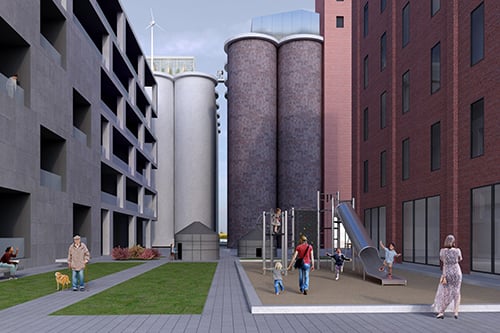A community advocacy group challenges a real estate developer

«Image: Monument Architecture»
The fate of the long-defunct Canada Malting facility along the Lachine Canal in the Saint-Henri section of Montreal is the subject of rival proposals for multifamily housing, one from a real estate development firm seeking a traditional condominium complex and the second from an advocacy group proposing a community-based project.
The Canada Malting site was constructed in 1907 and ceased operations in 1989. Over the years, the site’s terracotta silos fell into disrepair and were covered with graffiti – with many cheeky spray-painted messages complaining about the harsh aroma permeating the wreckage. The site is currently owned by Quonta Holdings, an investment management firm, and is estimated to be worth between $5 million and $6 million.
The fate of the property began to gain a new degree of importance in when Renwick Development put forth a proposal in 2013 to construct a 700-unit condominium complex at the site. This generated a large degree of opposition from local residents, who believed a community-focused project would better serve the borough’s needs. The opponents to the condominium project gathered together into an advocacy group called À nous la Malting and sought to shift the conversation away from traditional multifamily housing.
Renwick Development has since scaled back its 700-unit proposal to a smaller project that incorporates social housing units. Noam Schnitzer, founder and developer at Renwick Development, told the McGill Daily that he envisioned creating “a total of 240 units, of which 80 will be social housing units, and the rest will be condominiums.”
However, the social housing units would be segregated in a separate building on the property, with the remaining available square footage devoted to commercial spaces and an artists’ workspace collaborative. Schnitzer added that under his plan, “the provision of the services would not depend upon government funding.”
Earlier this week, À nous la Malting unveiled renderings of its vision for the Canada Malting site. This proposal envisioned a collectively owned development consisting of 200 affordable rental units, plus spaces for public daycare, a community kitchen, a rooftop garden, a bicycle repair shop and a museum. In its presentation, À nous la Malting emphasized its championing of social housing for the neighbourhood and the need to create “a refuge for people being displaced by gentrification.”
“We want to show people that it is possible to develop our city differently,” said Shannon Franssen, a member of À nous la Malting, in a CBC interview. “We don't need to make profit off people’s need for housing and for essential services.”
À nous la Malting stated that it worked on this proposal for the past few years, with financial backing from Centraide of Greater Montreal and the Sud-Ouest borough. The presentation included detailed architectural plans for transforming the current eyesore of a site into an aesthetic pleasing multifamily development.
Julie Bélanger, director of the office of Le Sud-Ouest borough mayor Benoît Dorais, told the McGill Daily that the Canada Malting site “is very complicated” and is burdened with “a ton of issues” including the need for extensive land decontamination. Bélanger acknowledged being eager to see how the financial aspects of À nous la Malting’s proposal would add up.
But what if neither the condominium option nor the community-focused proposal worked? Belanger admitted the borough needs new housing units – it has the lowest vacancy rate in Montreal – buy she did not envision the City of Montreal stepping in to buy the property and coordinate new housing construction.
“We don’t have the means to buy it, and it wouldn’t be responsible to do so,” she said.



